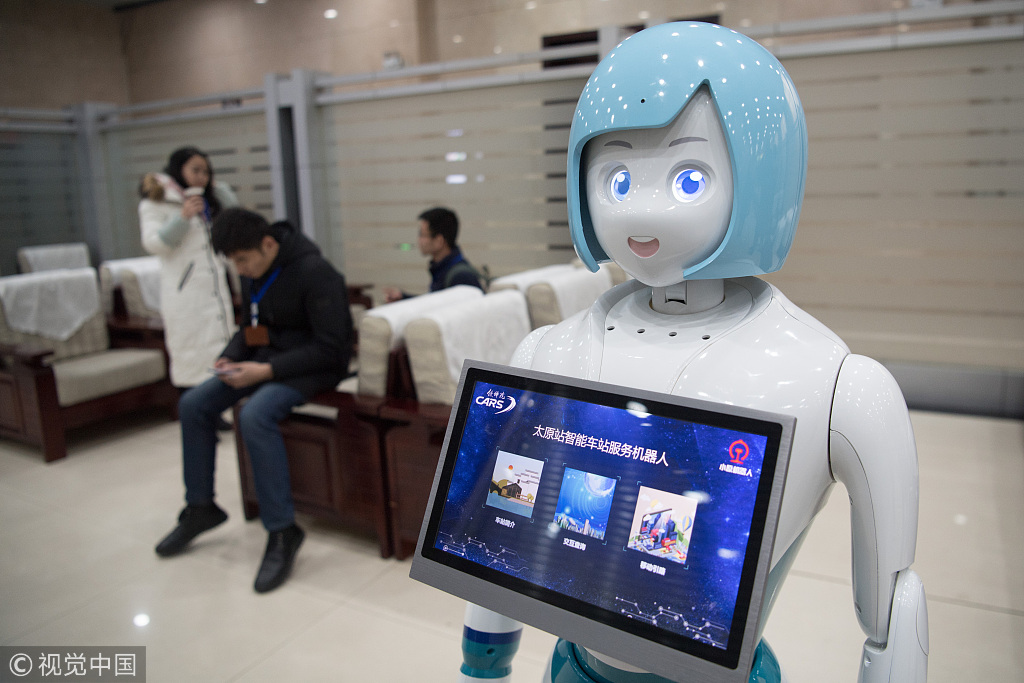AI drives China's economic development
- By Zhang Liying
 0 Comment(s)
0 Comment(s) Print
Print E-mail China.org.cn, February 23, 2018
E-mail China.org.cn, February 23, 2018

Artificial intelligence (AI) is becoming a major driver powering the upgrading of traditional industries and supply-side structural reform in China.
A rising global front-runner in AI
"China is among global front-runners in AI development, with AI research being conducted in a wide range of fields," said Tao Jianhua, deputy director of the National Laboratory of Pattern Recognition at the Institute of Automation, Chinese Academy of Sciences.
As of June, 2017, the number of Chinese AI companies reached 592, accounting for 23.3 percent of the world's total. The country saw 30,115 applications for AI-related patents in 2016 following a continuous increase for almost two decades.
China has made many breakthroughs in AI research and its industrial applications. For example, the accuracy rate of a facial recognition system developed by Chinese internet giant Baidu is up to 99.84 percent, and Tencent, another Chinese internet conglomerate, set a record by achieving a recognition rate of 83.29 percent in the MegaFace challenge, an internationally recognized test known for its high level of difficulty.
A growing trend of 'AI Plus'
The growth rate of China's AI industry in 2017 is expected to be 51.2 percent, with its value reaching 15.21 billion yuan, according to statistics released by iiMedia Research, a Chinese consulting agency.
The development of China's AI market is driven by a growing trend of "AI Plus," Tao Jianhua said.
"AI is integrating rapidly with other sectors in China, producing a great number of AI products such as smart cars, wearable devices and intelligent robots," said Hao Liyang, an analyst from the China Internet Network Information Center.
There is enormous potential to promote the integration of AI into traditional industries, especially manufacturing, as China is trying to further its supply-side structural reform and develop advanced manufacturing.
A coming period of adjustment
AI has become an appealing sector for investment and startups in China. By the end of June last year, China raised 63.5 billion yuan, 33.18 percent of the total global AI financing and only second to America on the list.
However, bubbles are already growing in this seemingly booming market. Some insiders claim that China's AI industry will enter a period of adjustment in 2018.
Some AI startups will go bankrupt at the end of 2018 after they run out of their financing, Li Kaifu, co-founder and CEO of Sinovation Ventures, said last year.
China's AI sector is somewhat overheated, but the market will sift out uncompetitive companies and thus promote the healthy development of the industry, said Sun Ning, deputy director of the State Key Laboratory of Robotics and System.
Increasing influence of AI on China's economy
Science Magazine predicted that AI would drive global employment to 50 percent in 2045, and the figure in China would be 77 percent.
A report released by Accenture, a global services company, shows that AI will boost China's labor productivity by 27 percent and generate $7.1 trillion for the country's economy by 2035.
"AI will reshape various sectors in China, which means that companies have to conduct restructuring to promote AI application," said Chen Xiaobing, president of Accenture China.
A plan for AI development issued by the State Council, China's cabinet, set the target of China becoming a major center for AI innovation and leading the world in AI technology and applications by 2030.
To achieve this target, China needs to cultivate more AI professionals, Tao Jianhua said.
As of March, 2017, more than 1.9 million professionals worked for the global AI industry, with 850,000 in America and only a little over 50,000 in China. The country is expected to witness an undersupply of more than 5 million AI professionals in the next few years.
Tao Jianhua suggested three measures for China to cultivate more AI professionals, namely improving cultivation mechanisms, encouraging companies to train professionals and enhancing international talent cooperation.






Go to Forum >>0 Comment(s)